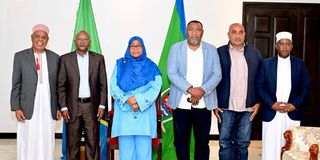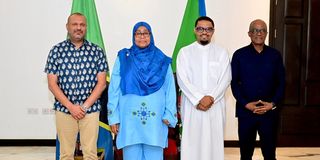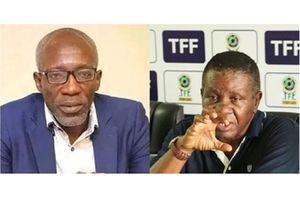
Tanzania President Samia Suluhu Hassan poses for a group photo with leaders of Simba and Yanga football clubs after holding talks with them at Chamwino State House in Dodoma. PHOTO | COURTESY
President Samia Suluhu Hassan's intervention to resolve the Yanga–Simba football dispute was both timely and necessary.
But that it had to reach her desk in the first place is a damning indictment of the leadership at the Tanzania Football Federation (TFF) and the Tanzania Premier League Board (TPLB).
State House should be a place where sports leaders are invited to be congratulated for triumphs, not summoned to settle disputes they have allowed to spiral out of control.
The facts are now well known. Yanga were scheduled to host Simba at the Benjamin Mkapa Stadium on March 8.
But hours before kick-off, Simba pulled out, citing denial of access to conduct pre-match training at the venue. They demanded accountability for those who blocked them.
Yet, the league’s own regulations do not permit match boycotts in such circumstances; disciplinary action should be taken against perpetrators—not used as an excuse to abandon fixtures.
In a troubling move, the so-called 72-hour committee refused to yield and insisted the match would proceed, only to inexplicably postpone it two hours before kick-off.
Yanga, based in Kigamboni, dispatched their team to the stadium and demanded a walkover victory—an appeal rejected by the TPLB, which instead set a new match date: June 15.
What followed was a toxic standoff. Key officials, notably TFF President Wallace Karia and TPLB Chairman Steven Mnguto, issued tone-deaf remarks that only escalated tensions.
Karia, returning from a CAF meeting, dismissed Yanga’s calls for resignations and reduced the issue to petty theatrics—telling journalists those aggrieved should “go act in their little drama.”
The dismissiveness was not just unhelpful; it was inflammatory.
Instead of demonstrating leadership, the authorities clung to vague clauses and failed to justify their decisions.
The claim that the match was postponed due to “signals of unrest and corruption” was as unconvincing as it was opaque.
Yanga responded with fury. Not only did they demand accountability, but they also raised new grievances—alleging unpaid prize money for three years and threatening to boycott the FA Cup final, the remaining league fixtures, and even next season.
Rather than defuse the situation, the TPLB poured fuel on the fire by holding meetings that only deepened mistrust, especially after it emerged that a senior government official may have been involved in barring Simba from the stadium.
By then, the issue had spiralled far beyond one match. Yet, the TFF Executive Committee remained silent, refusing to convene even an emergency meeting. Minister for Sports Prof Palamagamba Kabudi attempted mediation but quickly distanced himself, calling the matter “a trap.”

The result was a dangerous impasse. Yanga made it clear: they would not honour the rescheduled June 15 match.
Simba responded in kind: if the match was postponed again, they would not play at all. The TPLB found itself paralysed.
Her decision to summon all parties and move the fixture to June 25 was a masterstroke of crisis management.
But it was a move that exposed the utter failure of sports governance in Tanzania.
Why did a matter that should have been managed by football bodies require presidential intervention?
Why was there no institutional capacity to mediate, investigate, or enforce accountability?
The root of the issue is not the March 8 fixture, nor the June 15 reschedule.
It is the systemic weakness of our football institutions—an unwillingness to act when action is needed, and a tendency to rely on outdated assumptions that disputes will resolve themselves through inertia.
From the start, Yanga’s demand for the resignation of two TPLB officials was never outrageous.
It was a call for accountability. But instead of addressing it, the TFF opted for silence.
It could have launched an independent investigation and asked the officials to step aside temporarily—standard practice in any credible governance structure.
Equally problematic was the conflict of interest embedded in the system. Mnguto chairs both the TPLB and the very committee that postponed the match.
How could Yanga’s complaint be fairly heard by a man effectively sitting in judgement of his own actions?
Let’s be clear: football is not a matter of national security. The President has far more urgent issues to address.
That she had to step in speaks volumes—not about her commitment, which is laudable—but about the failure of those mandated to lead the sport.
We should all celebrate that the dispute has been defused. But we should also reflect on the fact that this was a completely avoidable crisis.
It is time the TFF and TPLB stop operating like amateur outfits and start behaving like the custodians of a national game watched by millions.
If this episode teaches us anything, it is that sport—especially football—deserves independent, transparent, and credible mechanisms to manage disputes.
And that the ultimate ambition of any sports administrator should not be to avoid conflict, but to resolve it honourably and without dragging the Head of State into the mud.
In a better-run federation, Yanga and Simba would visit State House to present trophies, not quarrels.

